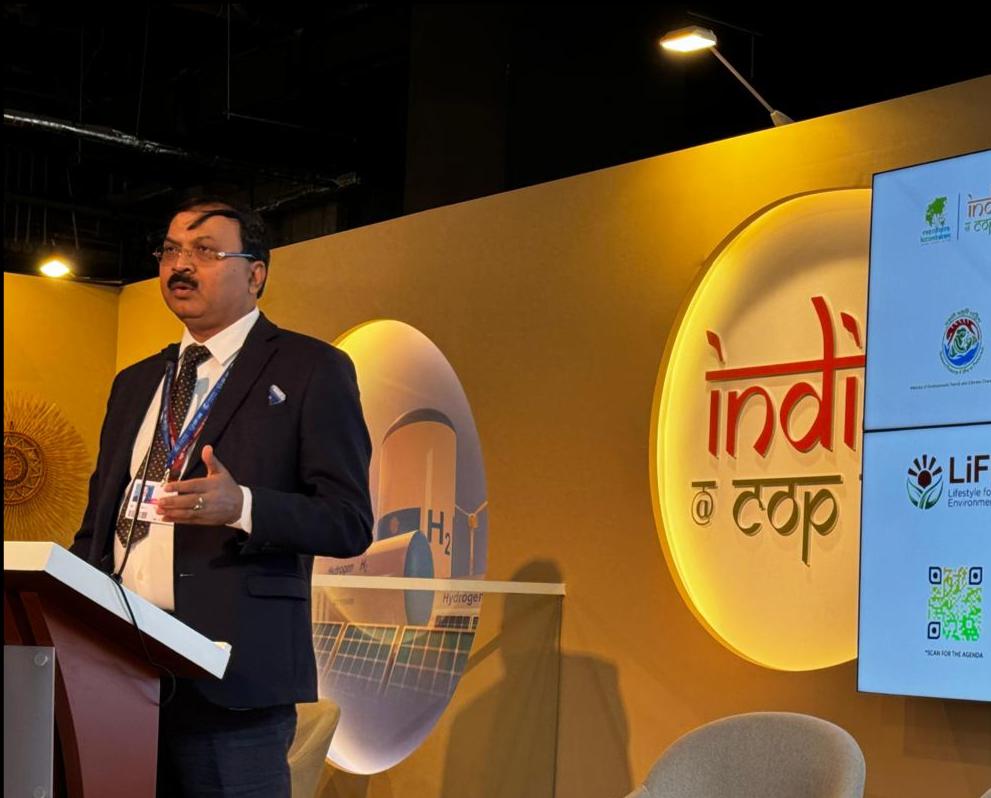In order to enhance economy and resilience of the coastal communities, the Odisha Government has been implementing a community-based action plan with an aim of making coastal communities more climate resilient and make their economy robust, said Satyabrata Sahu, ACS Forest, Environment and Climate Change at COP 28 UAE.
ACS Shri Sahu said Odisha Government with the support of Union Government and the Green Climate Fund has been implementing “Enhancing Climate Resilience of India’s Coastal Communities project in Ganjam, Puri, Kendrapara and Balasore districts, which has been providing encouraging results. K Murugesan, Director Environment Odisha also participated in the Presentation.
ACS Shri Sahu, who is holding Revenue & Disaster Management Department and also Special Relief Commissioner presented focus on disaster and climate resilience coastal ecosystems. He said that in Odisha Mangrove coverage is highest in the country and its coverage is on rise.
ACS Shri Sahu said that the Department of Forest, Environment and Climate Change is taking care of Ecosystem Restoration ( Mangroves, Saltmarsh, Seagrass and Watershed).
Shri Sahu also said that Fisheries and Animal Resource Development (FARD) is looking after Crab Fattening; Crab Hatchery; Ornamental Fishery; Seaweed farming, Fish Value added products; Fish Drying Unit.
Agriculture and Farmers’ Empowerment Department has been implementing System of Rice Intensification, said Shri Sahu.
Department of Mission Shakti is driving formation and strengthening of CBOs/ WSHGs to drive the project implementation, said he.
After getting encouraging response from the Integrated Coastal Zone Management Project (ICZM) Phase-I, the State Government with help of Centre through support of the World Bank is mulling to implement Odisha-SHORE Project. This Project is under consideration of the State Government.
Once the Government of Odisha decides to implement the project through support of the World Bank it will further scale up the work already undertaken under ICZMP Phase-1 by building upon the outcomes through a new project.
This project under consideration of the Odisha Government ‘Strengthening Coastal Resilience and the Economy (Odisha-SHORE) Project’, said Satyabrata Sahu, Additional Chief Secretary Forest, Environment and Climate Change.
Presenting the Project at COP 28 UAE, Shri Sahu said the the primary objective of the project is capacity building and institutional strengthening from regulation to sustainable management. Effective institutional mechanism and governance is crucial for ensuring the sustainability of integrated management of coastal regions.
The initial phase of the ICZM project has proposed several recommendations and investments which need to be implemented. Some measures include nature-based solutions like the plantation of mangroves and casuarina trees, ecological – monitoring of Chilika Lake, and conservation initiatives for Odisha’s precious biodiversity, including Irrawaddy dolphins, horseshoe crabs and saltwater crocodiles.
Another objective of the project is to bring investments for blue economic development for sustainable livelihood. To ensure the resilience of coastal livelihoods, it is essential to provide various support facilities to fisheries, such as improved landing centres, ice plants, etc. Additionally, it is crucial to explore options for livelihood diversification, utilizing local coastal resources, and promoting community-based ecotourism, as has been successfully implemented in several locations across the State.
For pollution management and circular economy, the project will support a plastic-based circular economy and promote alternatives to plastics. In addition, raising awareness among tourists and local communities about the importance of responsible waste management can help promote a cleanliness culture and contribute to the long-term protection of coastal ecosystems, ACS Shri Sahu said.


